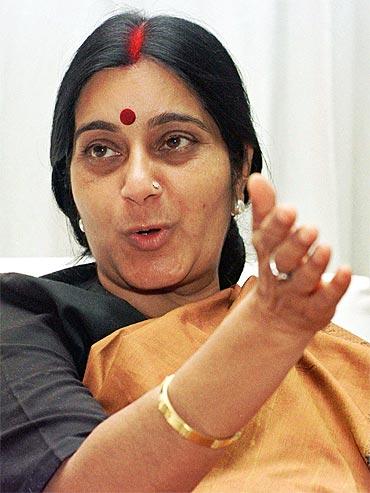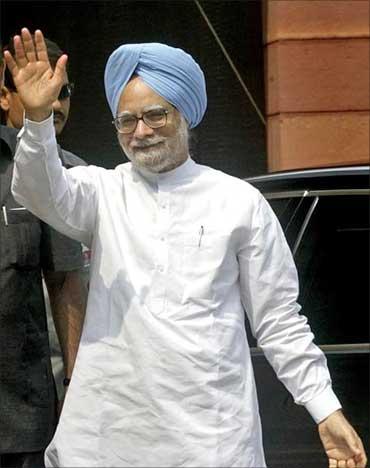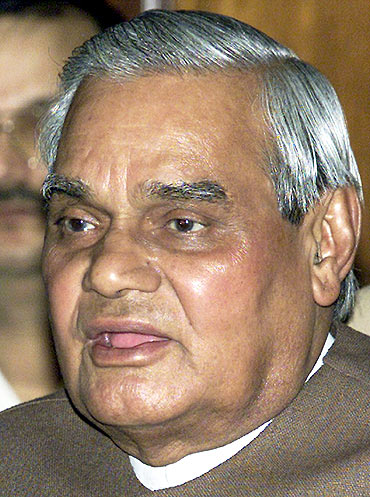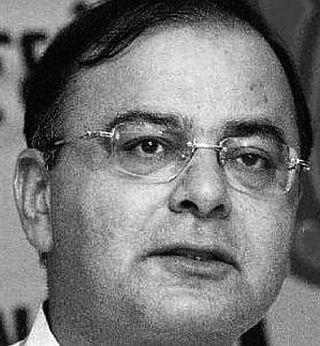Leader of Opposition in Lok Sabha Sushma Swaraj on Thursday justified her objection to exclusion of prime minister from the purview of the Lokpal bill saying the government has given no reasons for his exemption and insisted that nobody was above criminal law.
Just before the government introduced the Lokpal bill, Swaraj spoke in the Lok Sabha expressing her party's objection to the exclusion of the prime minister from the purview of the Lokpal.
"A basic objection we raised was the exemption given to the prime minister in the Lokpal bill. We want a Lokpal but an effective Lokpal. Several civil and criminal laws are passed in Parliament but none gives immunity to anybody. This is the first time this is being done," Swaraj said.
She maintained that though the bill includes cabinet minister, it does not include the prime minister and no reason has been given for this.
...
'PM hardly speaks but when he does nobody listens'
Image: Prime Minister Dr Manmohan Singh"If the logic is that the prime minister has to take several sensitive decisions, then the defence minister also has to take decisions which are sensitive and so does the home minister. In some decisions, the prime minister and others are involved but while others can be prosecuted the prime minister cannot be," Swaraj said.
Citing examples, she said in the 2G spectrum scam the prime minister is reported to have been in the know of the decisions taken while in the Commonwealth Games projects he was involved in decision making according to the comptroller and auditor general. But the bill states that as long as the PM is in office he is above prosecution by Lokpal.
Taking a dig at the government and the Congress party, Swaraj said, "The prime minister wants to be in the purview of the Lokpal. The PM hardly speaks but when he speaks nobody listens to him."
...
'PM in India does not enjoy immunity from law'
Image: Former Prime Minister Atal Bihari VajpayeeSwaraj said former Prime Minister Atal Bihari Vajpayee had set at rest all debate on inclusion of the PM within purview of Lokpal by saying he wanted to be within its ambit.
"The issue here is that though we could not pass the Lokpal bill when we were in power, we have not changed our stand on the issue. But Pranab Mukherjee, who as chairperson of the standing committee on home affairs in 2002, had agreed to inclusion of PM within Lokpal ambit, he is changing his stand now," Swaraj said.
Leader of Opposition in Rajya Sabha Arun Jaitley said keeping the prime minister outside the purview of Lokpal is not acceptable in criminal law which has a non-discriminatory provision.
"Prime Minister in India does not enjoy immunity from law. Even the CBI can investigate him. This is the first time the Prime Minister has been treated as a class apart," Jaitley said.
...
'Judicial Lokpal should deal with higher judiciary'
Image: Leader of Opposition in Rajya Sabha Arun JaitleyThe eminent lawyer said Lokpal will deal with procedural law and under it; it would be illogical to keep the PM out of the purview of the ombudsman.
"The prime minister does not work alone. Some ministers and bureaucrats work with him," he said, adding that giving him immunity would hamper investigations against others as well.
"Others will have to wait till he relinquishes office...if you have a corrupt prime minister you suffer him even if he is corrupt," Jaitley said. The people would have to wait till he completes his term to prosecute him.
Asked if PM should be exempted from being held accountable for certain sensitive functions, Swaraj said, "The exemptions on use of secret funds and such matters are already mentioned in our Lokpal bill."
Jaitley said there should be a "judicial Lokpal" to deal with higher judiciary as there were several aspects which needed to be dealt with exclusively.
"Under the present collegium system judges appoint judges and judges judge the judges. This system has not succeeded... both in regard to appointment and complaints there is need for a judicial Lokpal," he said.





article